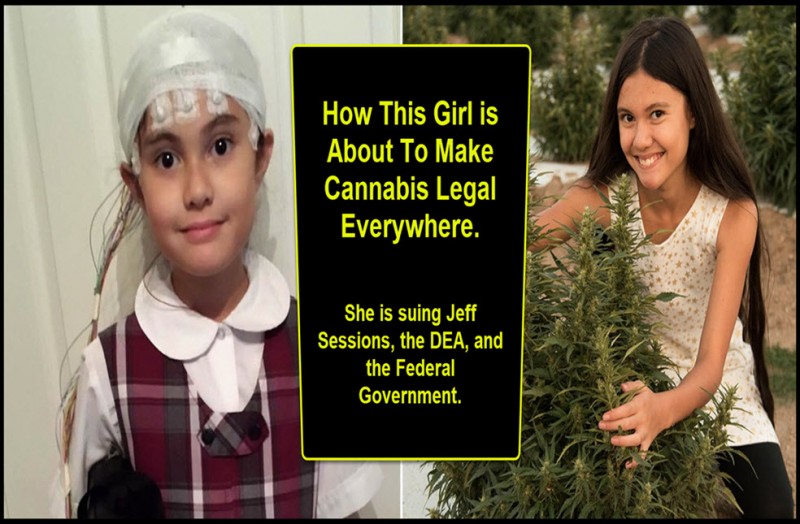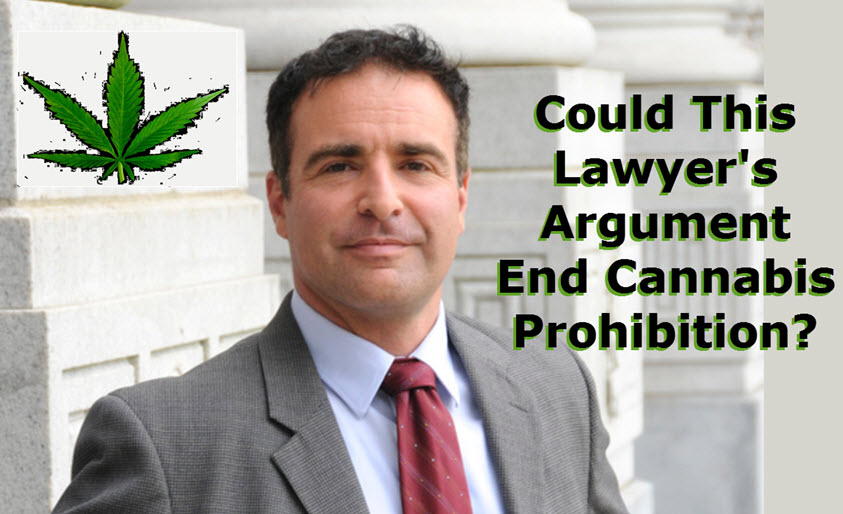How This 12 Year Old Epileptic Girl May Get Pot Legalized Nationally, and Soon.
14 Year-Old Alexis Bortell May Get Marijuana Legalized in America from CannabisNet on Vimeo.
As Rolling Stone reported, Alexis Bortell, a 12-year-old girl from Texas with epilepsy, has filed a federal lawsuit claiming that banning the transport of medical cannabis across state lines violates her constitutional rights as an epileptic girl.
Bortell, who is clearly mature and intelligent beyond her years, uses Haleigh’s Hope cannabis oil to treat her chronic epileptic seizures. Her case is so severe that she needs to take the oil orally twice a day, but also relies on a THC spray just in case of an aura, or a pre-seizure event. Auras occur around once a month, although the frequently of the auras have decreased since she relocated to Colorado. Bortell and her family were left with no choice but to relocate to get a hold of cannabis medicine, since doctors in Texas recommended experimental lobotomy as a last resort.
“I’m over two years seizure-free because of my cannabis medicine. In Texas, our goal was three days, and that’s the max I ever got,” she says. “It’s helped me succeed in school more, since I don’t have to go to the nurse every day because of auras and seizures. There was no medicine in Texas that would stop my seizures, and not only that, but they had horrendous side effects that would be worse than the actual seizure.”
The National Organization for the Reform of Marijuana Laws (NORMAL) offered to lobby Bortell’s reps in DC just last September. Bortell couldn’t personally attend because she can’t travel anywhere without her medicine; doing so would mean she was committing a federal felony by taking a Schedule 1 drug across state lines. She attended via Skype, but even if she could make it to DC where cannabis is legal both recreationally and medically, it’s still prohibited to take cannabis onto federal land – including the Capitol as well as military bases, national parks, and monuments.
Bortell is currently one out of the five plaintiffs who have filed a lawsuit against the federal government claiming that the Controlled Substances Act (CSA), which states that cannabis is illegal, violates constitutional rights. “This is not just a case about the CSA. This is a civil rights case that focuses on the rights of individuals using life-saving medication to preserve their lives and health,” says Michael Hiller, Bortell’s attorney. “It’s not just about cannabis, it’s about people’s ability to exercise their rights to free speech, to petition the government for a redress of grievances under the First Amendment, the right to travel, the fundamental right to be left alone and the right against Congressional overreach.”
Hiller acts as the co-counsel for the lawsuit, which is also made up of Joseph Bondy, Lauren Rudick, and David Holland. The lawsuit was filed in September to the United States District Court for the Southern District of New York. All of the lawyers are members of the New York Cannabis Bar Association, and are working on it pro bono hoping that the outcome would reschedule cannabis and it would no longer be a Schedule 1 substance.
The defendants, Jeff Session, Chuck Rosenberg, the Department of Justice, the DEA as well as its incumbent director, and the United States of America, are set to file a motion to dismiss on October 13. Should the judge grant the motion, an appeal to the Second Circuit will be filed by the plaintiffs.
The lawsuit is expected to have a significant impact on the lives of millions of Americans, especially the thousands of children suffering from epilepsy. Co-plaintiffs include Jagger Cotte, a 6-year-old MMJ patient from Georgia with Leigh’s Disease; Jose Belen, a disabled military vet with PTSD who survived two runs in Iraq; Marvin Washington, former football athlete who launched a business out of CBD-based products, as well as the Cannabis Cultural Association, an NGO that helps people of color find work in the cannabis industry.
The attorneys cite 10,000 years of history in the complaint, discussing all the benefits that society has enjoyed from cannabis as medicine and its other uses. By the time the CSA was ratified in 1971, cannabis was supposed to be in the Schedule 1 category temporarily despite the fact that it didn’t fit the description of what a Schedule 1 substance truly is. “What is deeply troubling about all of this is that the CSA makes absolutely no sense,” states Hiller. “We know for a fact that the US government knows that cannabis cannot be legally classified as a Schedule 1 drug, the requirements for which are a high potential for abuse, no medical efficacy whatsoever, and a substance so dangerous that it can’t be tested even under strict medical supervision. And we know cannabis doesn’t meet those requirements.”
What’s even worse is that Hiller recognizes that there is a divide between how the government operates and what they’re claiming when it comes to cannabis. “The government has obtained a patent for cannabis based on the fact that it works,” he says, citing the number of diseases it has a patent on for treatment including autoimmune disorders, Alzheimer’s, Parkinson’s, and HIV-induced dementia. US patent law states that you can’t apply for a patent until you’ve proven the efficacy of what you’re requesting a patent for.
OTHER STORIES YOU MAY ENJOY...
THIS LAWYER MAY LEGALIZE CANNABIS, READ THIS..
OR..
GROWING HEMP IS ILLEGAL, READ THIS..
 Rolling Stone
Rolling Stone







